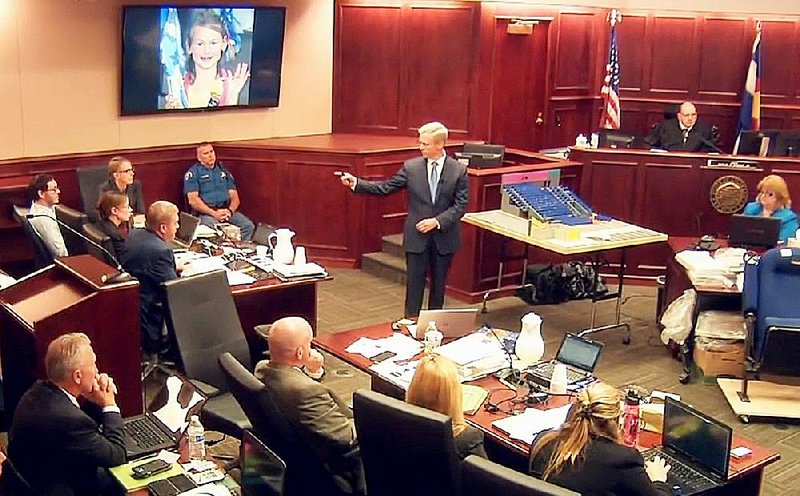CENTENNIAL, Colo. -- Colorado theater shooter James Holmes was convicted Thursday in the 2012 attack on moviegoers at a midnight premiere after jurors rejected defense arguments that the 27-year-old was insane at the time and driven to murder by delusions.
The initial phase of Holmes' trial took 11 weeks, but it took jurors only about 12 hours over a day and a half to decide on all 165 charges. The same panel will decide his sentencing.
For almost an hour, Judge Carlos Samour Jr. read charge after charge, reciting the name of the victim, the offense and the word "guilty." Dressed in a blue shirt and khakis, and flanked by his public defenders, Holmes stood impassively with his hands in his pockets the whole time.
When Samour read the first finding -- that Holmes was guilty of first-degree murder for killing 26-year-old Jonathan Blunk, a father of two who died throwing himself in front of his girlfriend to shield her from the barrage -- numerous victims' families burst into sobs, trying to stifle the noise by pressing tissues to their noses and mouths.
"As soon as you heard the first guilty, we knew all the dominoes were about to fall," said Tom Sullivan, whose son Alex was killed in the shootings.
Holmes' parents, Arlene and Robert, sat silently holding hands throughout the verdicts. After the final count was read, Arlene Holmes buried her face in her husband's shoulder.
The verdict came almost three years after Holmes, dressed head-to-toe in body armor, slipped through the emergency exit of the darkened theater that was showing the movie The Dark Knight Rises in suburban Denver. The shooting rampage left 12 dead and 70 wounded.
His victims included two active-duty servicemen, a single mom, a man celebrating his 27th birthday and an aspiring broadcaster who had survived a mall shooting in Toronto. Several died shielding friends or loved ones.
During the trial, prosecutors argued that Holmes meticulously planned the crime, insisting that he was sane and that he should be held responsible for the bloodshed. Holmes' attorneys, meanwhile, argued that his mental illness was to blame for the shooting.
Prosecutors said Holmes knew exactly what he was doing when he methodically gunned down strangers in the stadium-style theater, taking aim at those who fled.
The prosecution, led by District Attorney George Brauchler, called more than 200 witnesses over two months, more than 70 of them survivors, including some who had lost limbs and were using wheelchairs as a result of the shooting. They recalled the panic to escape the gunman.
Katie Medley, who was nine months pregnant at the time, described her agonizing decision to leave her wounded husband, Caleb, behind in the theater so she could save their baby. She later gave birth in the same hospital where he was in a coma. He can no longer walk and has trouble talking.
Prosecutors also brought in professors and classmates who described Holmes' struggles as a first-year graduate student in the neuroscience program at the University of Colorado. Holmes dropped out in June 2012, after he failed important oral exams and declined the chance to retake them.
There was little doubt that Holmes was the lone gunman. Holmes was arrested in the parking lot as survivors were still fleeing and he later pleaded innocent by reason of insanity.
His attorneys acknowledged in a court filing two years ago that he was the gunman, writing that Holmes "was in the throes of a psychotic episode when he committed the acts that resulted in the tragic loss of life and injuries sustained by moviegoers on July 20, 2012."
Defense attorney Daniel King argued that Holmes suffers from schizophrenia and was in the grip of a psychotic breakdown so severe that he was unable to tell right from wrong -- Colorado's standard for insanity. His lawyers said he was delusional even as he secretively acquired the three murder weapons -- a shotgun, a handgun and an AR-15 rifle -- while concealing his plans from friends and two psychiatrists in the months before the shooting.
Defense lawyers tried to portray him as a once-promising student so crippled by mental illness that he couldn't reveal his struggles to anyone who might have helped. They called a pair of psychiatrists, including a nationally known schizophrenia expert, who concluded that Holmes was psychotic and legally insane.
But two state-appointed doctors found otherwise, testifying for prosecutors that no matter what Holmes' mental state was that night, he knew what he was doing was wrong.
Jurors watched nearly 22 hours of videotaped interviews showing Holmes talking in a flat, mechanical tone about his desire to kill strangers to increase his self-worth.
Prosecutors showed jurors Holmes' spiral notebook, where he scribbled a self-diagnosis of his "broken mind" and described his "obsession to kill" since childhood. The pages alternate between incoherent ramblings and elaborate plans for the killings, including lists of weapons to buy and diagrams showing which auditoriums in the theater complex would allow for the most casualties.
Jurors saw an investigator's video of the shooting's aftermath. It showed bodies wedged between rows of seats and sprawled across aisles littered with spent ammunition, spilled popcorn and blood.
Penalty phase ahead
Holmes now enters the penalty phase of his trial. On Wednesday, the jury will begin weighing the toll and nature of Holmes' actions to decide whether to send him to prison for life or to Colorado's death row. Court officials say this phase could last as long as a month.
The district attorney is seeking the death penalty.
A death sentence would be a rarity for Colorado, as would an execution. Colorado sentenced 22 people to death between 1973 and 2013, according to the Justice Department, a number exceeded by 30 other states and the federal government over that period. The state has three inmates on death row and has executed only one inmate since the Supreme Court reinstated the death penalty in 1976.
Before the verdict was delivered, Samour, the judge overseeing the trial, gave the jurors 62 pages of instructions and reminded them not to consider Holmes' potential punishment.
While he noted that the penalty itself would be decided during a later phase, he told jurors what would happen if they accepted the insanity defense, adding that he was providing the detail for informational purposes only.
"If the defendant is found not guilty by reason of insanity, he will never again be tried on the merits of the criminal charges filed against him," Samour wrote.
The trial had been pushed back multiple times by delays, including arguments over evaluations of Holmes' sanity, before jury selection finally began in January.
Information for this article was contributed by Sadie Gurman of The Associated Press; by Mark Berman of The Washington Post; by Jack Healy and Julie Turkewitz of The New York Times; and by Maria L. La Ganga of the Los Angeles Times.
A Section on 07/17/2015


